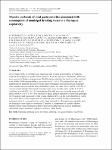Massive outbreak of viral gastroenteritis associated with consumption of municipal drinking water in a European capital city
Werber, Dirk
Lausevic, D.
Mugosa, B.
Vratnica, Z.
Ivanovic-Nikolic, L.
Zizic, L.
Alexandre-Bird, A.
Fiore, L.
Ruggeri, F. M.
Bartolo, I. Di
Battistone, A.
Gassiloud, B.
Perelle, S.
Kaluski, D. Nitzan
Kivi, M.
Andraghetti, R.
Pollock, K. G. J.
On 24 August 2008, an outbreak alert regarding cases of acute gastroenteritis in Podgorica triggered investigations to guide control measures. From 23 August to 7 September, 1699 cases were reported in Podgorica (population 136 000) and we estimated the total size of the outbreak to be 10 000–15 000 corresponding to an attack rate of ~10%. We conducted an age- and neighbourhood-matched case-control study, microbiologically analysed faecal and municipal water samples and assessed the water distribution system. All cases (83/83) and 90% (89/90) of controls drank unboiled chlorinated municipal water [matched odds ratio (mOR) 11·2, 95% confidence interval (CI), 1·6–∞]. Consumption of bottled water was inversely associated with illness (mOR 0·3, 95% CI 0·1–0·8). Analyses of faecal samples identified six norovirus genotypes (21/38 samples) and occasionally other viruses. Multiple defects in the water distribution system were noted. These results suggest that the outbreak was caused by faecally contaminated municipal water. It is unusual to have such a large outbreak in a European city especially when the municipal water supply is chlorinated. Therefore, it is important to establish effective multiple-barrier water-treatment systems whenever possible, but even with an established chlorinated supply, sustained vigilance is central to public health.
No license information

